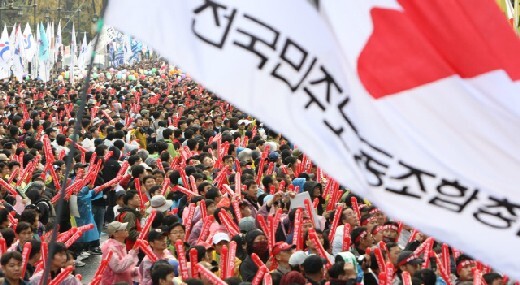hankyoreh
Links to other country sites 다른 나라 사이트 링크
KCTU gears up to fight Lee administration’s labor policies

Roughly 500 voting representatives gathered as one voice at the Korean Confederation of Trade Unions (KCTU, Minju Nochong) regular representatives meeting at the Olympic Hall in Seoul’s Songpa-gu neighborhood Wednesday afternoon, saying they wanted to “fight the Lee Myung-bak administration even harder.”
“We have an obligation to be victorious for the irregular workers who have been kicked out into the streets in the cold front that is being restructured,” said Jin Yeong-ok, the KCTU’s senior vice chairperson.
Lee Suk-haeng, the chairman of the umbrella union, currently in prison at Seoul Prison, said, in a letter read at the gathering, that “now is an important time, one that will determine the rise or fall of the KCTU.”
The KCTU plans to launch an “all out war” against the Lee administration in February, since it has again made known its intention to have the ruling Grand National Party pass revisions to laws on irregular workers and the minimum wage in the extraordinary National Assembly session scheduled for that month. The KCTU plans to launch its offensive with demands for labor-government negotiations early in the month, and will then hold large daily rallies beginning in the third week, leading to a protest involving 30,000 of its members on the 28th.
“We can’t stop the bad legislative proposals originating with Lee Myung-bak,” said KCTU Secretary-General Lee Yong-sik. “Unless we have a war.”
There are a lot of submerged rocks that are likely to emerge as obstacles for the KCTU as it pushes through the storm. The economic situation is both a crisis and an opportunity for the KCTU. Union members live in constant fear of being laid off, and irregular workers are already being let go. It is an unpredictable situation in which things could explode into struggle or recede as members shrink back in fear. Also a burden for the organization is a social atmosphere that will not sympathize with labor strikes in a time of economic crisis. It is unfortunate to see that the economic stagnation is weakening the union’s ability to wage labor struggles and that it could see a rise in self-interest among regular, as opposed to irregular, workers, and among unions at different companies.
For starters, there are fewer participants at KCTU rallies. Fewer than 100 KCTU members actually joined in its “48-Hour National Action to Stop the Broadcast Law” in the final days of 2008.
Union officials confirm that they are seeing a continued lack of power to involve large numbers of people in protests.
Also restricting the KCTU’s options is the fact the Lee administration refuses to recognize the KCTU as a partner for dialogue and the administration’s use of coercive tactics against the Korean Teachers and Education Workers Union (KTU, Jeon Gyo Jo) and the Federation of Government Employee Unions. Then there is the problem of having its chairman in prison.
Some are demanding that the union take an even more offensive posture, placing hope in the KCTU that it can be the entity that defends the rights of workers by standing up to the anti-labor Lee administration.
Participants at the representatives meeting voted to change the name of its Central Executive Committee to the “Emergency Struggle Headquarters for the Right to Work and Winning Basic Labor Rights” and decided to hold a “total strength” struggle against Lee Myung-bak administration in June.
“Even if we lose some of our ability to mobilize people, we will win if we win the country’s sympathy,” said Woo Moon-sook, the spokeswoman of KCTU.
Please direct questions or comments to [englishhani@hani.co.kr]
Editorial・opinion
![[Column] Season 2 of special prosecutor probe may be coming to Korea soon [Column] Season 2 of special prosecutor probe may be coming to Korea soon](https://flexible.img.hani.co.kr/flexible/normal/500/300/imgdb/original/2024/0426/3317141030699447.jpg) [Column] Season 2 of special prosecutor probe may be coming to Korea soon
[Column] Season 2 of special prosecutor probe may be coming to Korea soon![[Column] Park Geun-hye déjà vu in Yoon Suk-yeol [Column] Park Geun-hye déjà vu in Yoon Suk-yeol](https://flexible.img.hani.co.kr/flexible/normal/500/300/imgdb/original/2024/0424/651713945113788.jpg) [Column] Park Geun-hye déjà vu in Yoon Suk-yeol
[Column] Park Geun-hye déjà vu in Yoon Suk-yeol- [Editorial] New weight of N. Korea’s nuclear threats makes dialogue all the more urgent
- [Guest essay] The real reason Korea’s new right wants to dub Rhee a founding father
- [Column] ‘Choson’: Is it time we start referring to N. Korea in its own terms?
- [Editorial] Japan’s rewriting of history with Korea has gone too far
- [Column] The president’s questionable capacity for dialogue
- [Column] Are chaebol firms just pizza pies for families to divvy up as they please?
- [Column] Has Korea, too, crossed the Rubicon on China?
- [Correspondent’s column] In Japan’s alliance with US, echoes of its past alliances with UK
Most viewed articles
- 1[Column] Season 2 of special prosecutor probe may be coming to Korea soon
- 2‘We must say no’: Seoul defense chief on Korean, USFK involvement in hypothetical Taiwan crisis
- 3Is N. Korea threatening to test nukes in response to possible new US-led sanctions body?
- 4Amnesty notes ‘erosion’ of freedom of expression in Korea in annual human rights report
- 5Division commander ordered troops to enter raging flood waters before Marine died, survivor says
- 6N. Korean delegation’s trip to Iran shows how Pyongyang is leveraging ties with Moscow
- 7[Editorial] Korea’s surprise Q1 growth requires objective assessment, not blind fanfare
- 8Is Japan about to snatch control of Line messenger from Korea’s Naver?
- 9No good, very bad game for Korea puts it out of Olympics for first time since 1988
- 10[Reportage] On US campuses, student risk arrest as they call for divestment from Israel